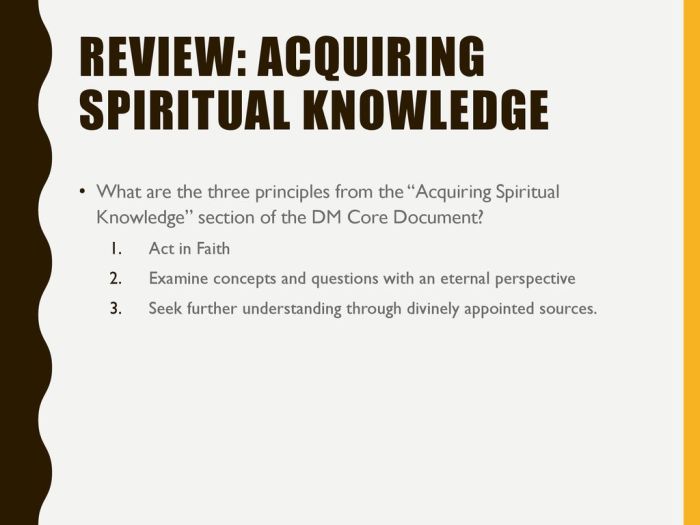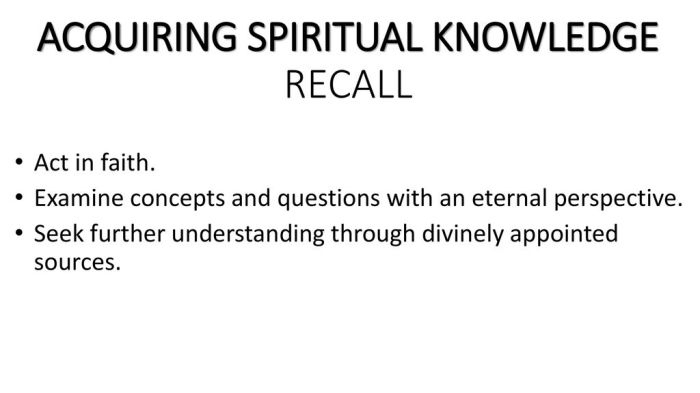Seek further understanding through divinely appointed sources – Delving into the profound realm of seeking further understanding through divinely appointed sources, this discourse embarks on a captivating journey into the heart of spiritual exploration. From ancient traditions to modern-day practices, the pursuit of divine guidance has shaped human history and continues to resonate deeply within the human psyche.
Throughout this exploration, we will delve into the multifaceted nature of divinely appointed sources, examining their role in fostering spiritual growth, empowering decision-making, and facilitating personal transformation. By unraveling the methods and techniques employed to access and interpret these sources, we gain insights into the profound wisdom that lies beyond our immediate perception.
Divine Sources for Understanding
The concept of divinely appointed sources refers to the belief that certain sources, such as sacred texts, prophets, or spiritual experiences, provide access to divine knowledge and guidance. These sources are considered to be authoritative and reliable, offering insights and wisdom beyond human understanding.
Examples of divinely appointed sources include:
- Religious scriptures (e.g., the Bible, Quran, Torah)
- Spiritual leaders (e.g., priests, rabbis, imams)
- Mystical experiences (e.g., visions, dreams, revelations)
- Ancient wisdom traditions (e.g., I Ching, astrology)
Methods used to access and interpret divinely appointed sources vary depending on the source and tradition. These may include prayer, meditation, study, or seeking guidance from spiritual advisors.
Benefits of Seeking Further Understanding
Seeking further understanding through divinely appointed sources can enhance spiritual growth, decision-making, and personal development. It provides individuals with:
- A deeper connection to the divine
- Increased self-awareness and self-understanding
- Guidance in making difficult decisions
- Inspiration for personal transformation
Real-life examples include individuals who have found solace and guidance in sacred texts during times of crisis, or those who have made life-changing decisions based on insights gained through spiritual experiences.
Challenges and Considerations

Seeking further understanding through divinely appointed sources is not without challenges. These include:
- Discerning between genuine divine guidance and personal biases
- Overreliance on external sources rather than developing one’s own spiritual intuition
- Potential for misinterpretation or manipulation
It is important to seek guidance from trusted spiritual leaders or mentors who can provide support and guidance in interpreting divine sources. Discernment and critical thinking are also essential to ensure that personal biases or wishful thinking do not cloud one’s judgment.
Applications in Daily Life

Divine guidance can be incorporated into daily life in various ways, such as:
- Seeking guidance in making decisions
- Finding solace and inspiration during challenging times
- Cultivating self-awareness and personal growth
- Connecting with the divine through prayer or meditation
By being open to divine guidance, individuals can find support, wisdom, and direction in their daily lives.
Comparative Perspectives: Seek Further Understanding Through Divinely Appointed Sources
Different spiritual traditions and belief systems approach the concept of divine guidance in diverse ways. The following table compares some of the key differences:
| Tradition | Methods of Accessing | Role of Spiritual Leaders | Emphasis |
|---|---|---|---|
| Christianity | Prayer, Bible study, spiritual retreats | Guidance and support | Seeking God’s will |
| Islam | Quran, Hadith, Sufi practices | Authority and guidance | Following the teachings of the Prophet Muhammad |
| Buddhism | Meditation, mindfulness, teachings of the Buddha | Guidance and wisdom | Developing compassion and enlightenment |
| Hinduism | Vedas, Upanishads, spiritual gurus | Guidance and enlightenment | Understanding the nature of reality and the divine |
Historical and Cultural Context

The role of divinely appointed sources has varied throughout history and across cultures. In ancient times, prophets and oracles were often consulted for guidance. In the Middle Ages, religious scriptures and spiritual leaders held great authority. In modern times, there has been a growing emphasis on personal spiritual experiences and the development of one’s own intuition.
Examples of historical figures who relied on divine guidance include Moses, who received the Ten Commandments from God, and Joan of Arc, who claimed to have been guided by divine voices.
Commonly Asked Questions
What are divinely appointed sources?
Divinely appointed sources refer to entities or phenomena believed to convey divine guidance or wisdom. These sources may include sacred texts, spiritual leaders, dreams, intuition, or any other medium through which individuals perceive divine communication.
How can seeking divine guidance benefit me?
Seeking divine guidance can enhance spiritual growth by deepening one’s connection to the divine, fostering a sense of purpose and meaning. It can also support decision-making by providing insights and clarity, and facilitate personal development by guiding individuals toward self-discovery and transformation.
How can I discern between genuine divine guidance and personal biases?
Discerning between genuine divine guidance and personal biases requires self-reflection, humility, and seeking guidance from trusted spiritual leaders or mentors. It involves examining one’s motivations, aligning with one’s values, and seeking confirmation through multiple sources or experiences.